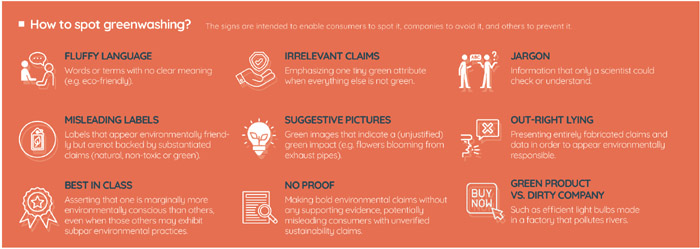However, not all claims of eco-friendliness are what they seem. Welcome to the eye-opening journey into the complex realm of greenwashing, where appearances can be deceiving, and genuine environmental stewardship is often overshadowed by clever marketing tactics.
Defining greenwashing
The term refers to deceptive marketing practices employed by some companies to create the illusion of environmental responsibility while hiding their true impact on the planet.
Greenwashing example
Greenwashing involves a company exaggerating or falsely claiming its environmental efforts to appear more eco-friendly than it truly is. For instance, a clothing brand might label its products as “100% organic,” implying sustainability, while in reality, only a small fraction of the fabric used is organic, giving consumers a deceptive sense of environmental responsibility.
Authentic sustainability efforts
Conversely, genuine sustainability efforts involve a company taking concrete steps to reduce its environmental impact, such as implementing energy-efficient manufacturing processes, responsibly sourcing materials, and actively disclosing accurate information about their practices. An authentic example would be a technology company that invests in renewable energy sources to power its data centers and openly reports its progress toward achieving carbon-neutral operations.
Our Shared Responsibility
As responsible corporate citizens and members of the American Chamber of Commerce in Slovakia, we have understood that sustainability is not just a buzzword; it’s an ethical obligation. The commitment should extend beyond words, driving us to adopt authentic sustainability practices that align with our values and benefit society and the environment.
The dedication to authentic sustainability is evident through:
- Transparency: Companies must believe in complete transparency regarding their sustainability efforts. This means openly sharing goals, progress, and challenges with the stakeholders and the broad public.
- Certifications and standards: It is advised to actively seek and adhere to recognized sustainability certifications and standards relevant to your industry, ensuring your practices meet the highest environmental and ethical criteria.
- Community engagement: We all should engage with local communities to understand their unique environmental concerns and collaborate on solutions that benefit both our business and the environment.
- Eco-conscious partnerships: The right approach is to choose partners and suppliers who share your commitment to sustainability, ensuring your entire supply chain aligns with your values.
In a world where greenwashing threatens genuine sustainability efforts, DTSE Slovakia as a company within this Chamber, remains steadfast in our commitment to true sustainability. Through transparency, adherence to standards, innovation, and community engagement, we pave the way for a future where businesses genuinely prioritize the environment.
We invite fellow companies, consumers, and stakeholders to join us in this journey. Together, we can create a marketplace where authenticity prevails, greenwashing is exposed, and our shared planet thrives.

Markéta Tichavská, CSR Specialist, DTSE Slovakia



Follow us